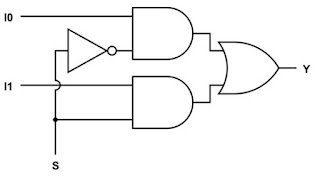N-bit Adder Verilog
N-bit Adder using generate
Lets examine the full adder

Lets examine the full adder

module Full_adder(output S, Cout, input A, B, Cin);
wire w1, w2, w3;
xor G1 (w1, A, B);
xor G2 (S, w1, Cin);
and G3 (w2, A, B);
and G4 (w3, w1, Cin);
or G5 (Cout, w2, w3);
endmodule
N-bits Adder requires
Two N-bits Input variables (A, B)
1-bit Cin
One N-bits Output variable (S)
1-bit Cout
N-Full Adders
and internal mapping
____________________________________________________________________________
//Design Code
module Nbit_Adder(S, Cout, A, B, Cin);
parameter N = 8;
input [N-1:0] A, B;
input Cin;
output [N-1:0] S;
output Cout;
wire [N:0] C;
assign C[0] = Cin;
assign Cout = C[N];
genvar i;
generate for (i=0; i<N ; i=i+1)
begin
wire w1, w2, w3;
xor G1 (w1, A[i], B[i]);
xor G2 (S[i], w1, C[i]);
and G3 (w2, A[i], B[i]);
and G4 (w3, w1, C[i]);
or G5 (C[i+1], w2, w3);
end
endgenerate
endmodule
____________________________________________________________________________
//Test Bench
module Adder_test;
reg [7:0] A, B;
reg C0;
wire [7:0] S;
wire C4;
Nbit_Adder ADD1 (S, C4, A, B, C0);
initial
begin
$display("A(hexa) B(hexa) Cin(Bit) \t S(hexa) Cout(bit)");
$monitor("%h \t %h \t %b \t\t %h \t %b", A[7:0], B[7:0], C0, S[7:0], C4);
A = 8'h00; B = 8'h00; C0 = 1'b0;
#5 A = 8'h01; B = 8'h01; C0 = 1'b1;
#5 A = 8'h01; B = 8'h09; C0 = 1'b0;
#5 A = 8'h0E; B = 8'h00; C0 = 1'b1;
#5 A = 8'hFF; B = 8'h01; C0 = 0'b1;
#5 $finish;
end
endmodule
____________________________________________________________
Output
A(hexa) B(hexa) Cin(Bit) S(hexa) Cout(bit)
00 00 0 00 0
01 01 1 03 0
01 09 0 0a 0
0e 00 1 0f 0
ff 01 0 00 1
00 00 0 00 0
01 01 1 03 0
01 09 0 0a 0
0e 00 1 0f 0
ff 01 0 00 1
_______________________________________________________________



Comments
Post a Comment